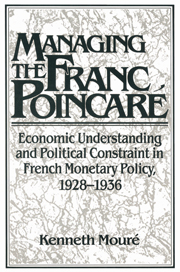 Managing the Franc Poincaré
Managing the Franc Poincaré Book contents
- Frontmatter
- Contents
- List of figures and tables
- Acknowledgments
- Abbreviations used in the notes
- Introduction
- 1 The depression in France
- 2 French gold accumulation, 1928–1932
- 3 The World Economic Conference and the gold bloc
- 4 The Bank of France: market control and interest-rate policy
- 5 The Treasury and government finance
- 6 The devaluation debate
- 7 Devaluation of the franc
- Conclusion
- Appendix
- Bibliography
- Index
7 - Devaluation of the franc
Published online by Cambridge University Press: 23 November 2009
- Frontmatter
- Contents
- List of figures and tables
- Acknowledgments
- Abbreviations used in the notes
- Introduction
- 1 The depression in France
- 2 French gold accumulation, 1928–1932
- 3 The World Economic Conference and the gold bloc
- 4 The Bank of France: market control and interest-rate policy
- 5 The Treasury and government finance
- 6 The devaluation debate
- 7 Devaluation of the franc
- Conclusion
- Appendix
- Bibliography
- Index
Summary
The end of deflation
The Popular Front's election victory on 3 May precluded the possibility of any further deflation; its platform had promised an end to the injustices of the decree laws, greater support for agriculture, a large public works program, and increased social welfare spending, including a national unemployment insurance system. The Socialists hoped to generate recovery by augmenting purchasing power, believing that prices would then fall because of higher production and tax revenue would rise to finance the growth in government spending. Such a program would take time to accomplish: To avoid capital flight and gold losses, the Popular Front program called for exchange control.
The Bank of France lost gold steadily in the election period and the weeks before the Popular Front took power: 1.7 billion francs in the last week of March, 3 billion francs in April, and 2.7 billion francs in the first week of May. Prime Minister Sarraut threatened to resign immediately if Blum did not declare Popular Front policy on defense of the franc: On 10 May Blum announced that the Popular Front remained opposed to devaluation. Exchange controls made political sense to prevent the economic sabotage of the Popular Front program by the holders of capital. Either devaluation or exchange controls would soon be essential; choosing between them was one of Blum's most urgent tasks as he prepared to take office.
This chapter follows the course of influential opinion and the actions of the Blum government from the election victory to the devaluation of the franc.
- Type
- Chapter
- Information
- Managing the Franc PoincaréEconomic Understanding and Political Constraint in French Monetary Policy, 1928–1936, pp. 237 - 273Publisher: Cambridge University PressPrint publication year: 1991
